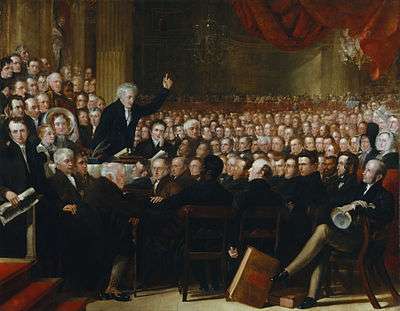William Brock (pastor)
| Rev. William Brock | |
|---|---|
|
William Brock | |
| Born | 1807[1] |
| Died | 1875[1] |
| Resting place | Abney Park Cemetery in Stoke Newington, London. |
| Nationality | English |
| Occupation | watchmaker and pastor |
| Known for | Slavery abolitionist, Bible society |
| Religion | Baptist |
Rev. Dr. William Brock (1807–1875), was the first minister of Bloomsbury Chapel in Central London (1848–72);[2] abolitionist,[1] biographer, and supporter of missionary causes.
Early years
William Brock was of Dutch descent; his ancestors came to England as pilgrims or asylum seekers to escape religious oppression in Holland in the 16th century. He began working life as a watchmaker in Hertford at a shop owned by a Mr Field. He lodged nearby with a lay village pastor, whose enthusiasm tempted him to try his skill in such voluntary pastoral work. In due course, William Brock gave up his watch-making to become a pastor. He applied to the Baptist College, Stepney from where he graduated a few years later. He was offered employment at St Mary’s Church, Norwich. Here he stayed for fifteen years, though not infrequently travelling to London to support meetings of the non-denominational ‘Missionary Society’, which gradually evolved into the nondenominational but largely nonconformist London Missionary Society.
His links with both Anglicans and Nonconformists may have helped him, in 1848, to be appointed minister of the first purpose-built central London Baptist Chapel - the Bloomsbury Chapel[2] - whose establishment had hinged partly on overcoming objections from the Anglican establishment.
Ministerial life at Bloomsbury Chapel and later
At his Bloomsbury Chapel, which served Central London north of the River Thames, William Brock’s hearty, low-key, oratorial style was in marked contrast to that being developed at the Baptist chapel the South Bank by the ‘crowd-pulling’ evangelist, the Rev. Spurgeon. At an ordination service for a missionary, to which both had been invited, Spurgeon noted how extraordinarily different they were: he found Brock’s delivery to be massive, ornate, rich in words, too ponderous for our tongue, and in terms which would have suited none but himself, but, he generously added it was ’homely, hearty, intense, overwhelming; it did our soul good.

- ^ The Anti-Slavery Society Convention, 1840, Benjamin Robert Haydon, 1841, National Portrait Gallery, London, NPG599, Given by British and Foreign Anti-Slavery Society in 1880
The welcoming, homely style of William Brock also showed itself in his inclusive approach to different denominations upon leaving Bloomsbury Chapel. Still in good health, but having given up his financially comfortable position as pastor of a major Central London church on reaching the age of 65, he chose to supply churches and chapels of all denominations, part-time. He became, to use his own words, "churchless, wifeless, homeless" in one week, and adapted to retirement from Bloomsbury Chapel by renting rooms in Hampstead (close to where his eldest son lived) for the summers, whilst, during winters, he ‘hibernated’ as he called it, on the south coast, at St. Leonards, where the air was fresher and the climate milder.
Career as a Biographer
Amongst his wider interests, William Brock was an active member of the Peace Society pioneered by such figures as Henry Richard. William Brock was therefore opposed to warfare at the time of the Crimean War and Siege of Lucknow but nevertheless wrote well researched biography of the life of general Sir Henry Havelock, who was a fellow baptist. Published, in 1857, Brock's departure into contemporary biography, achieved an enormous circulation and ran to many popular editions. However, he was widely criticised by those who would not buy his book, including friends in the Baptist ministry and Peace Society, for attempting the portrayal of a Christian who was also a soldier in complex contemporary political and military events. Less controversial was his biography of John Bunyan; it too became a best-seller, bound into many of Cassell's late Victorian editions of Bunyan's works.
Abolitionist
Besides his interests in the work of the Peace Society, albeit somewhat compromised by his controversial biographical writing, William Brock was also active as an abolitionist. His name occurs frequently in accounts of meetings held in England during the 1840s, 1850s and early 1860s to support the abolition of slavery in the United States, and pressing for abolition in Josiah's Conder's nonconformist newspaper. At an early stage in this work, he appears as a delegate in the painting of the world's first international Anti-slavery Convention in 1840, which hangs in the National Portrait Gallery, London.[1]
Death and memorial
William Brock died at St. Leonard's on 13 November 1875, and was buried at Abney Park Cemetery in Stoke Newington, London.
